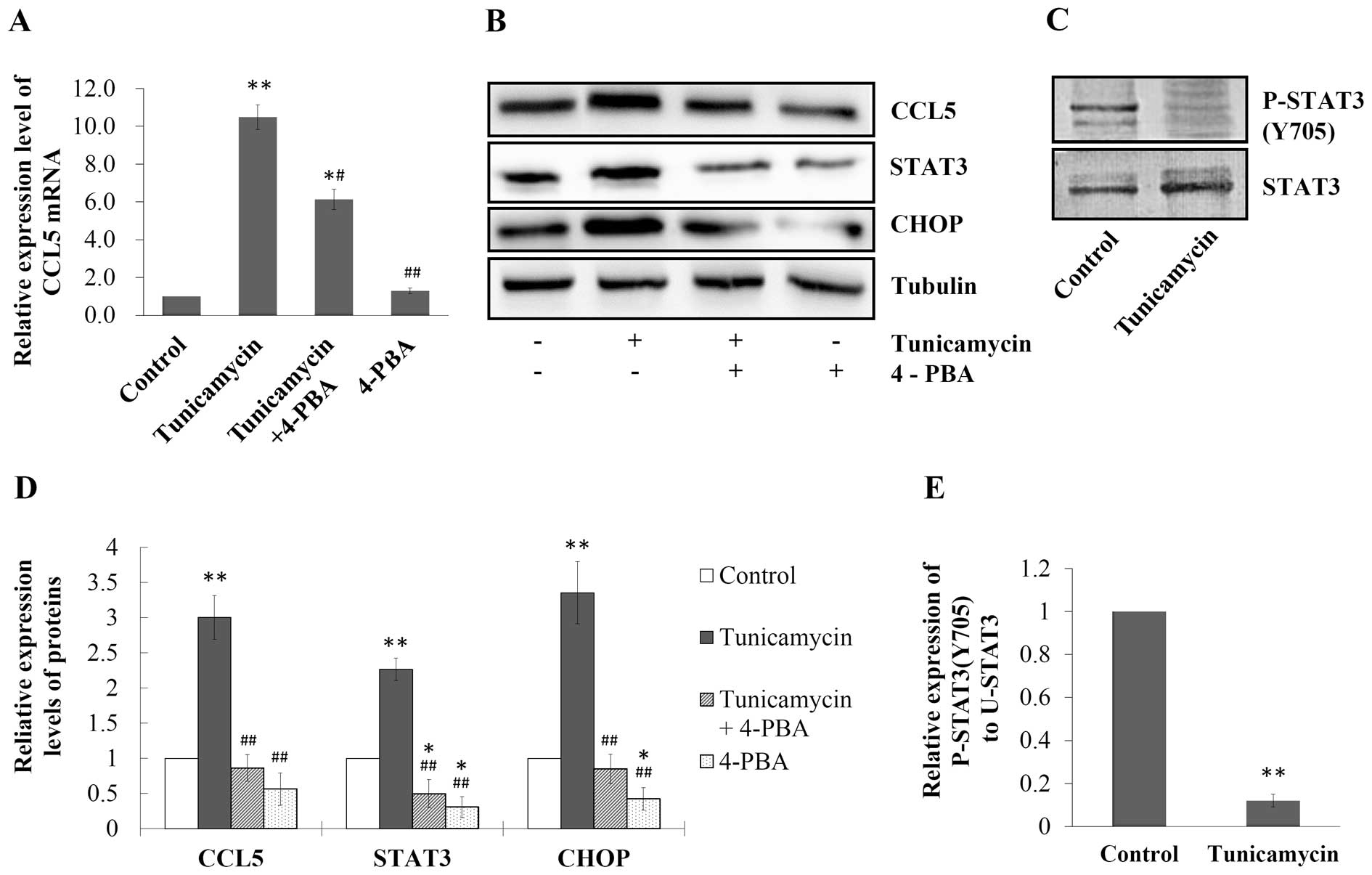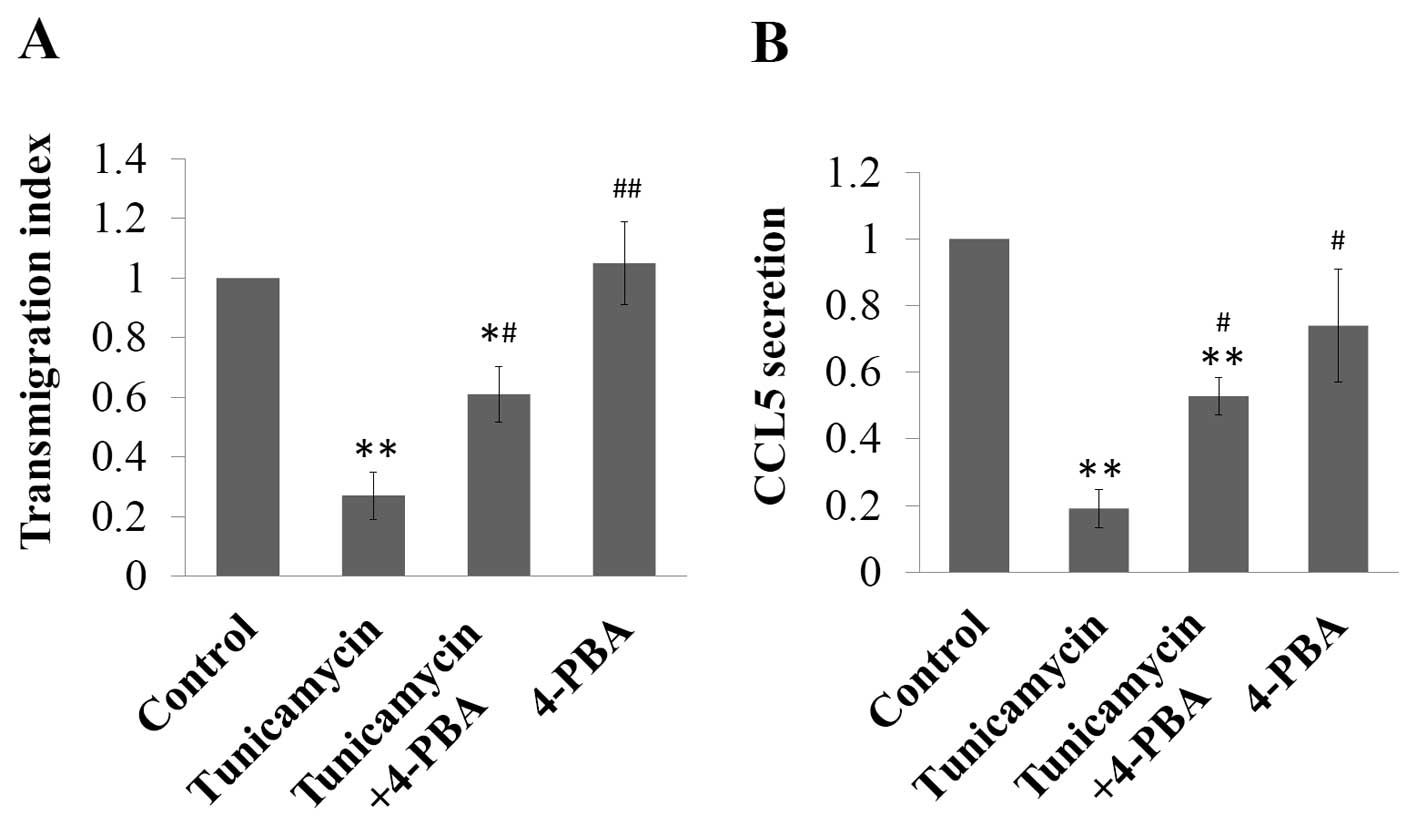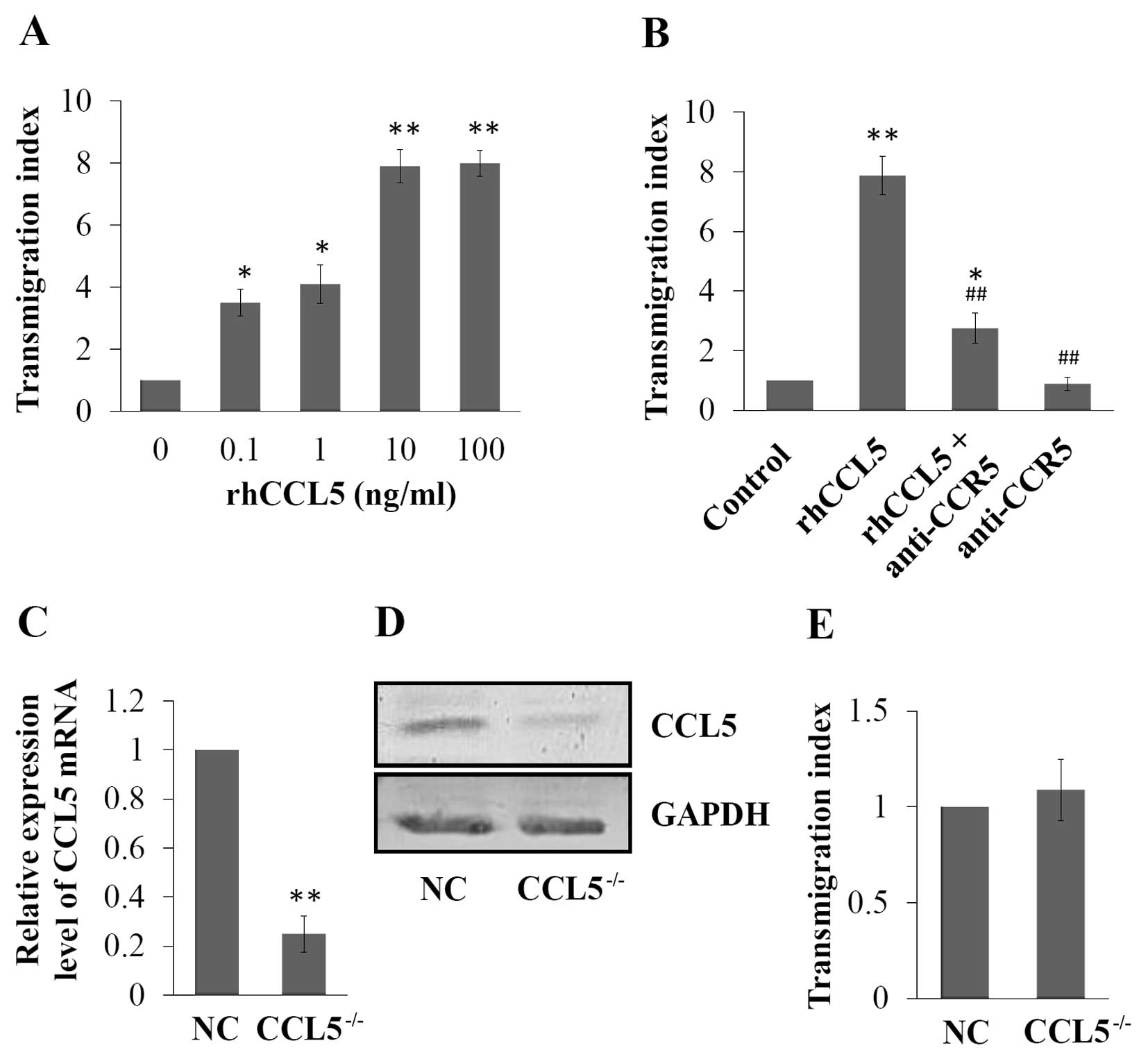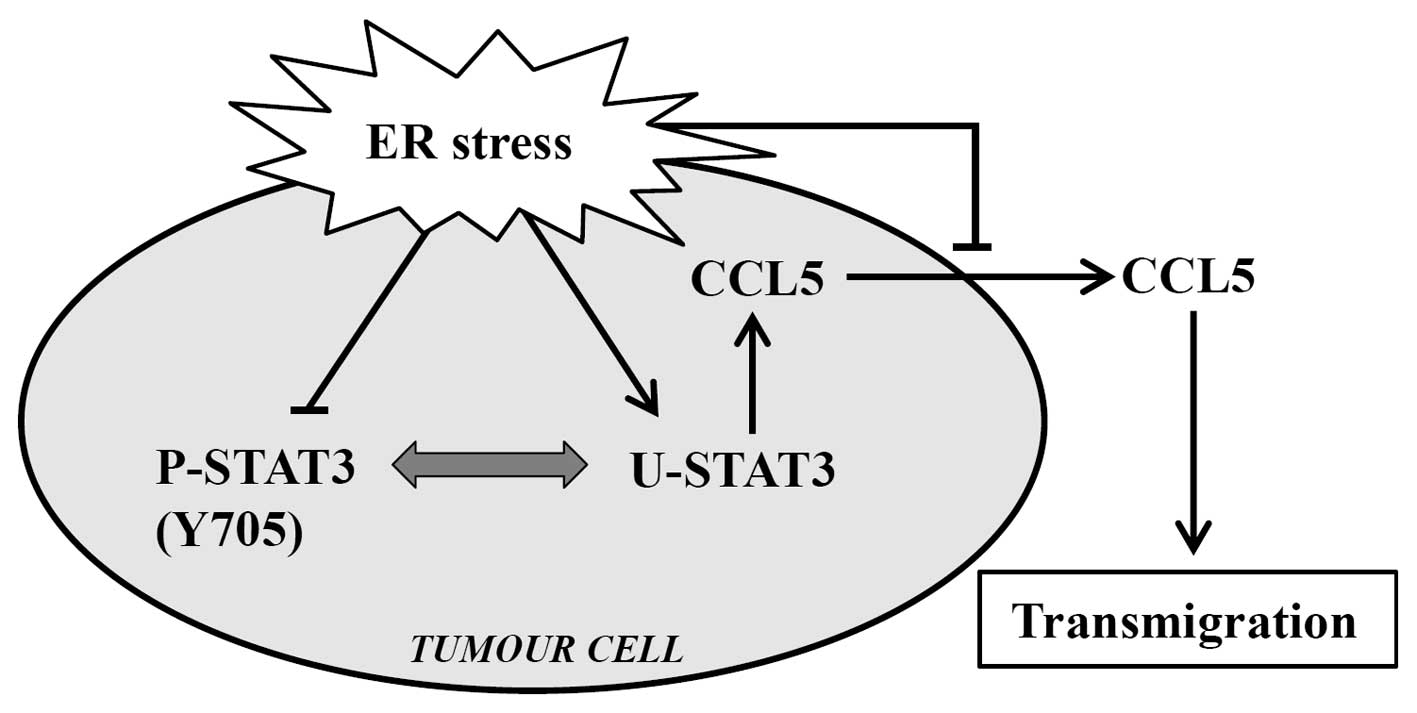|
1
|
Schall TJ, Jongstra J, Dyer BJ, et al: A
human T cell-specific molecule is a member of a new gene family. J
Immunol. 141:1018–1025. 1988.PubMed/NCBI
|
|
2
|
John AE, Berlin AA and Lukacs NW:
Respiratory syncytial virus-induced CCL5/RANTES contributes to
exacerbation of allergic airway inflammation. Eur J Immunol.
33:1677–1685. 2003. View Article : Google Scholar : PubMed/NCBI
|
|
3
|
Hillyer P and Male D: Expression of
chemokines on the surface of different human endothelia. Immunol
Cell Biol. 83:375–382. 2005. View Article : Google Scholar : PubMed/NCBI
|
|
4
|
Karnoub AE, Dash AB, Vo AP, et al:
Mesenchymal stem cells within tumour stroma promote breast cancer
metastasis. Nature. 449:557–563. 2007. View Article : Google Scholar : PubMed/NCBI
|
|
5
|
Pinilla S, Alt E, Abdul Khalek FJ, et al:
Tissue resident stem cells produce CCL5 under the influence of
cancer cells and thereby promote breast cancer cell invasion.
Cancer Lett. 284:80–85. 2009. View Article : Google Scholar : PubMed/NCBI
|
|
6
|
Zhang Y, Yao F, Yao X, et al: Role of CCL5
in invasion, proliferation and proportion of
CD44+/CD24− phenotype of MCF-7 cells and
correlation of CCL5 and CCR5 expression with breast cancer
progression. Oncol Rep. 21:1113–1121. 2009.PubMed/NCBI
|
|
7
|
Luboshits G, Shina S, Kaplan O, et al:
Elevated expression of the CC chemokine regulated on activation,
normal T cell expressed and secreted (RANTES) in advanced breast
carcinoma. Cancer Res. 59:4681–4687. 1999.PubMed/NCBI
|
|
8
|
Niwa Y, Akamatsu H, Niwa H, Sumi H, Ozaki
Y and Abe A: Correlation of tissue and plasma RANTES levels with
disease course in patients with breast or cervical cancer. Clin
Cancer Res. 7:285–289. 2001.PubMed/NCBI
|
|
9
|
Long H, Xie R, Xiang T, et al: Autocrine
CCL5 signaling promotes invasion and migration of CD133(+) ovarian
cancer stem-like cells via NF-κB-mediated MMP-9 upregulation. Stem
Cells. 30:2309–2319. 2012.PubMed/NCBI
|
|
10
|
Wang SW, Wu HH, Liu SC, et al: CCL5 and
CCR5 interaction promotes cell motility in human osteosarcoma. PLoS
One. 7:e351012012. View Article : Google Scholar : PubMed/NCBI
|
|
11
|
Stormes KA, Lemken CA, Lepre JV, Marinucci
MN and Kurt RA: Inhibition of metastasis by inhibition of
tumor-derived CCL5. Breast Cancer Res Treat. 89:209–212. 2005.
View Article : Google Scholar : PubMed/NCBI
|
|
12
|
Yang J, Chatterjee-Kishore M, Staugaitis
SM, et al: Novel roles of unphosphorylated STAT3 in oncogenesis and
transcriptional regulation. Cancer Res. 65:939–947. 2005.PubMed/NCBI
|
|
13
|
Yang J, Liao X, Agarwal MK, Barnes L,
Auron PE and Stark GR: Unphosphorylated STAT3 accumulates in
response to IL-6 and activates transcription by binding to
NFkappaB. Genes Dev. 21:1396–1408. 2007. View Article : Google Scholar : PubMed/NCBI
|
|
14
|
Bandarian V, Pattridge KA, Lennon BW,
Huddler DP, Matthews RG and Ludwig ML: Domain alternation switches
B(12)-dependent methionine synthase to the activation conformation.
Nat Struct Biol. 9:53–56. 2002. View
Article : Google Scholar : PubMed/NCBI
|
|
15
|
Levy DE and Darnell JE Jr: Stats:
transcriptional control and biological impact. Nat Rev Mol Cell
Biol. 3:651–662. 2002. View
Article : Google Scholar : PubMed/NCBI
|
|
16
|
Ng YP, Cheung ZH and Ip NY: STAT3 as a
downstream mediator of Trk signaling and functions. J Biol Chem.
281:15636–15644. 2006. View Article : Google Scholar : PubMed/NCBI
|
|
17
|
Waris G, Tardif KD and Siddiqui A:
Endoplasmic reticulum (ER) stress: hepatitis C virus induces an
ER-nucleus signal transduction pathway and activates NF-kappaB and
STAT-3. Biochem Pharmacol. 64:1425–1430. 2002. View Article : Google Scholar : PubMed/NCBI
|
|
18
|
Chen Y, Wang JJ, Li J, et al: Activating
transcription factor 4 mediates hyperglycaemia-induced endothelial
inflammation and retinal vascular leakage through activation of
STAT3 in a mouse model of type 1 diabetes. Diabetologia.
55:2533–2545. 2012. View Article : Google Scholar
|
|
19
|
Kimura K, Yamada T, Matsumoto M, et al:
Endoplasmic reticulum stress inhibits STAT3-dependent suppression
of hepatic gluconeogenesis via dephosphorylation and deacetylation.
Diabetes. 61:61–73. 2012. View Article : Google Scholar : PubMed/NCBI
|
|
20
|
Cho HY, Thomas S, Golden EB, et al:
Enhanced killing of chemo-resistant breast cancer cells via
controlled aggravation of ER stress. Cancer Lett. 282:87–97. 2009.
View Article : Google Scholar : PubMed/NCBI
|
|
21
|
Schönthal AH: Endoplasmic reticulum stress
and autophagy as targets for cancer therapy. Cancer Lett.
275:163–169. 2009.PubMed/NCBI
|
|
22
|
Li J and Lee AS: Stress induction of
GRP78/BiP and its role in cancer. Curr Mol Med. 6:45–54. 2006.
View Article : Google Scholar : PubMed/NCBI
|
|
23
|
Oyadomari S and Mori M: Roles of
CHOP/GADD153 in endoplasmic reticulum stress. Cell Death Differ.
14:381–389. 2004. View Article : Google Scholar : PubMed/NCBI
|
|
24
|
Azenshtein E, Luboshits G, Shina S, et al:
The CC chemokine RANTES in breast carcinoma progression: regulation
of expression and potential mechanisms of promalignant activity.
Cancer Res. 62:1093–1102. 2002.PubMed/NCBI
|
|
25
|
Mañes S, Mira E, Colomer R, et al: CCR5
expression influences the progression of human breast cancer in a
p53-dependent manner. J Exp Med. 198:1381–1389. 2003.PubMed/NCBI
|
|
26
|
Yaal-Hahoshen N, Shina S, Leider-Trejo L,
et al: The chemokine CCL5 as a potential prognostic factor
predicting disease progression in stage II breast cancer patients.
Clin Cancer Res. 12:4474–4480. 2006. View Article : Google Scholar : PubMed/NCBI
|
|
27
|
Ozcan U, Cao Q, Yilmaz E, et al:
Endoplasmic reticulum stress links obesity, insulin action, and
type 2 diabetes. Science. 306:457–461. 2004. View Article : Google Scholar : PubMed/NCBI
|
|
28
|
Lin S, Wan S, Sun L, et al: Chemokine C-C
motif receptor 5 and C-C motif ligand 5 promote cancer cell
migration under hypoxia. Cancer Sci. 103:904–912. 2012. View Article : Google Scholar : PubMed/NCBI
|




















